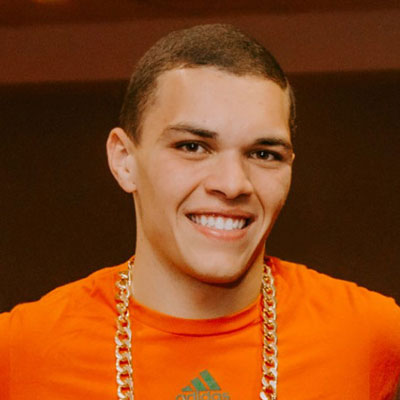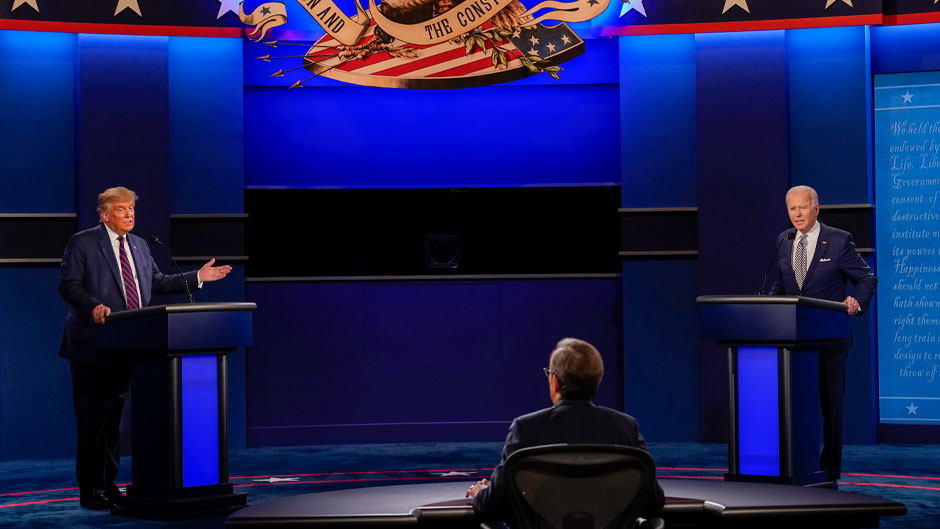What the presidential debate lacked—civility and productive discussion—the University of Miami Debate Team was able to accomplish easily during a virtual watch party of Tuesday night's debate.
Our team had the opportunity to partner with the Commission on Presidential Debates to offer a pre-debate show featuring a question-and-answer session with professors David Steinberg and Patrick Waldinger, directors of the team, and guest panelists. In addition, the team had a viewer chat during the debate in real time paired with surveys to measure audience responses. The event, with approximately 60 people, concluded with a moderated interactive post-debate discussion.
From our pre-debate discussion with guest panelists Craig Minassian, former assistant press secretary for President Bill Clinton, and Heidi Carr, a lecturer in the School of Communication, the event’s audience gained insightful knowledge about the debate’s expectations and strategies.
 As an intercollegiate policy debater, I had the opportunity to compare my debate experiences to that of the candidates. Unlike intercollegiate debate, where protected time exists to build a case on a particular policy preference, the presidential debate consisted of repeated interjections—notably by President Donald J. Trump—that made the overall performance incoherent. It was uncanny seeing the incumbent president perform a sparring match with not only his opponent, but moderator Chris Wallace as well.
As an intercollegiate policy debater, I had the opportunity to compare my debate experiences to that of the candidates. Unlike intercollegiate debate, where protected time exists to build a case on a particular policy preference, the presidential debate consisted of repeated interjections—notably by President Donald J. Trump—that made the overall performance incoherent. It was uncanny seeing the incumbent president perform a sparring match with not only his opponent, but moderator Chris Wallace as well.
It was clear to me that in the first half of the debate, former Vice President Joseph Biden was rattled. His initial attempts to react slightly more aggressively to Trump, even drawing first blood in the interrupting match, made both candidate’s messaging difficult to conceptualize. Biden adapted to these interjections and performed better in the second half of the debate. Rather than attempting to fight back, he became more restrained, appealing to both the moderator and the public about his inability to get a word in.
Additionally, unlike intercollegiate debate, where the audience is the judge, the presidential contenders lost sight of their audience: the United States electorate. Specifically, how can each candidate win over the critical swing state voters that remain undecided a month away from election day? In a newfound COVID-19 era where direct campaigning is extremely limited, the debate offered an excellent opportunity for the candidates to put themselves into the living rooms of U.S. voters.
The speaking style and how effectively the candidate connects to the voter is therefore important. On this measure, Biden performed better than Trump. Whereas Trump consistently spoke to and faced Biden or Wallace, Biden spoke directly to the camera. For instance, Biden looking into the camera and asking how many empty chairs we have at home due to COVID-19 hit the mark, producing perhaps the strongest debate moment. As a debater, I generally face and speak to my audience directly rather than the opponent. Trump would perceptually fare better in his next performance to keep his audience in mind, and Biden would do well to commit to more of these moments.
Ultimately, the contenders had a lackluster performance. In my debates, I persuade my judge that certain policies are preferable to the status quo. In the presidential debate, the candidates focused more on arguing rather than making arguments. At the end of it, do critical swing state voters actually understand the policy platforms of each candidate? Or at the bare minimum, do they understand the competing visions for the country?
It is difficult to walk away from this debate with an affirmation to these questions. All debaters must combine elements of offense and defense. There was plenty of offense in the debate, such as Trump attacking Hunter Biden or Biden calling Trump Putin’s puppy. Yet when the dust settled, it was difficult to see the defense—or what we call our “case” in debate—of each candidate. If I shouldn’t vote for the other person, why should I vote for you? After the mundane performance of both candidates, the next two debates will become exceedingly important before election day.
Being a part of the University of Miami Debate Team has been an amazing experience, and the event hosted Tuesday night was an excellent display of civil discourse among University members. I hope you join us for our next event on Oct. 7 for the vice-presidential debate.
Visit this site to register for the debate team’s virtual watch party.
Zachary M. Homeijer is a senior majoring in political science and president of the University of Miami Debate Team.

